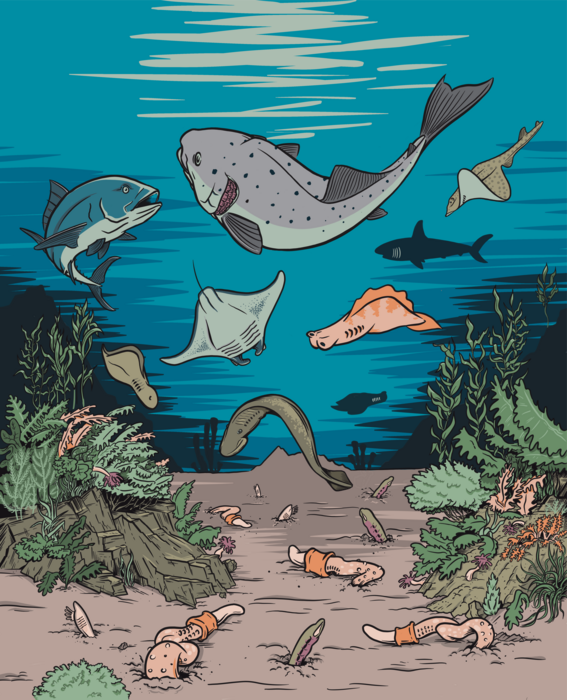Gills are best known for helping most fish species breathe underwater. But less well known is the fact gills regulate the salt and pH balance of fishes’ blood, a vital role played by the kidneys in other animals. Collectively known as ion regulation, this lesser-known gill function has been traditionally thought to have evolved in tandem with breathing.

Credit: Rashpal Dhillon, Rush Studio.
Gills are best known for helping most fish species breathe underwater. But less well known is the fact gills regulate the salt and pH balance of fishes’ blood, a vital role played by the kidneys in other animals. Collectively known as ion regulation, this lesser-known gill function has been traditionally thought to have evolved in tandem with breathing.
But surprising new research published in Nature is adding a new, early chapter to the evolutionary story of gills.
“Our work suggests that the early, simplified gills of our worm-like ancestors played an important role in ion regulation. And that role might have originated as early as the very inception of gills, well before they played any role in breathing,” says Dr. Michael Sackville, a zoologist who led the study while with the University of British Columbia (UBC).
“This really does flip the script on our understanding of how gills and gill function evolved.”
The evolution of gills and lungs has fascinated biologists, including Darwin, for more than 100 years. Prior to this study, gills were thought to be first used for breathing and ion regulation near the very beginning of vertebrate life. In this traditional timeline, these two functions shifted from the skin to the gills in tandem, helping vertebrates transition from small, worm-like creatures to larger, active fishes. This transition from “small and wormy” to “big and fishy” is an iconic event in vertebrate evolution.
The study traced the evolutionary journey of gills by comparing three animals that are alive today, but belong to different lineages: lampreys, which are vertebrates, and amphioxus and acorn worms, which are close relatives of vertebrates. The researchers assumed that any gill functions shared between the animals were inherited from a common ancestor, which is believed to be when simple gills first appeared well over 500 million years ago.
“We found that gills were used for breathing in only our vertebrate representative, and only with increasing body size and activity,” says Dr. Colin Brauner, a UBC zoologist and senior author on the paper.
“But we found ion regulating cells in the gills of all three of our animals. This allowed us to trace the origin of ion regulation at gills all the way back to early deuterostome animals, when very simple gill structures are thought to have first evolved. The finding supports the classic story that gills were first used for breathing in early vertebrates, but adds an exciting new, earlier chapter to the story, clearly worthy of further study.”
The study was conducted in collaboration with researchers at the University of Montreal and Cambridge University, and funded by the Natural Sciences and Engineering Council of Canada and Royal Society.
Journal
Nature
DOI
10.1038/s41586-022-05331-7
Method of Research
Observational study
Subject of Research
Animals
Article Title
Ion regulation at gills precedes gas exchange and the origin of vertebrates
Article Publication Date
19-Oct-2022
COI Statement
We declare we have no competing interests.




